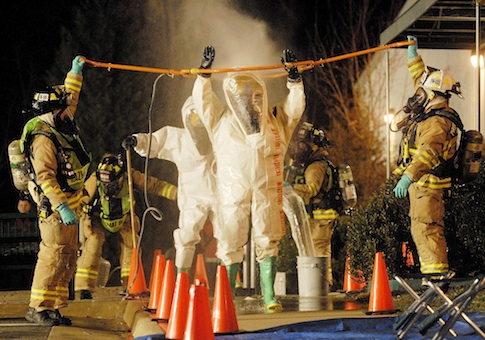The Department of Defense has been mishandling shipments of sensitive and highly dangerous hazardous materials, a security flaw that has created the "potential for public safety and national security consequences," according to a new report by the Government Accountability Office (GAO).
Hazardous materials shipments (HAZMAT), such as flammable liquids and gasses, have been mislabeled and mispackaged in multiple instances, causing concern that the Pentagon’s low standards could cause a national calamity, according to the report.
"The department faces some challenges ensuring the safe, timely, and cost effective transportation of some HAZMAT shipments," according to the report, which detailed multiple instances of failure on this front.
HAZMAT materials transported by ground and air were found to have "improper documentation and packaging" leading to transportation delays and even worse.
In some situations reviewed by the GOA, the improper security standards created "a potential for public safety and national security consequences," the report found.
"DOD installations," for instance, "did not provide carriers transporting sensitive arms, ammunition, and explosives HAZMAT with access to secure hold areas or assist them in locating the nearest alternate means to secure those shipments," according to the report.
The Pentagon is also employing carriers that have subpar safety records.
"The reliability of safety performance data calls into question DOD’s process for selecting eligible, and evaluating current, HAZMAT carriers to transport arms, ammunition, explosives, and sensitive and classified shipments," according to the report.
The GAO is urging the Pentagon to tighten its standards and ensure a "secure hold" of these materials going forward.
A "substantial number" of these HAZMAT shipments "were not documented and packaged" according to standards set forth by the Defense Department, according to the report.
Pentagon data has shown that "about 27 percent of HAZMAT received at all five major domestic military aerial ports over the past five fiscal years were delayed, primarily due to noncompliant documentation and packaging" flaws, according to the report.
These safety flaws have led to delays while employees scramble to track down the proper documentation and solve these packaging issues, the report states.
"These shipment delays can be as short as a few hours or last several weeks, depending on the nature of the issue," the report states.
DoD installations also have been cited for not providing access to "secure hold areas" for those carriers with arms, ammunitions, and explosives.
"At least 44 times during fiscal years 2012 and 2013, DOD installations did not provide commercial carriers with access to secure hold areas for arms, ammunition, and explosives shipments or assist them in finding alternatives, as required by DOD regulations," the report states.
"Not providing secure hold for even a small percentage of these sensitive shipments poses a risk to public safety and national security," the report concluded.
In one instance, a shipment of "rusted acetylene gas cylinders," which are a flammable gas, were improperly packed and stacked on wooden boxes, causing a dangerous situation.
These gas cylinders "had arrived at the aerial port improperly packaged—stacked on top of one another in lidless wooden boxes," the report found
In another instance, a shipment of a flammable liquid known as acetaldehyde, a toxic carcinogen, were delayed because the material had not been properly documented.
Similar documentation issues were identified with a HAZMAT shipment of lithium batteries, according to the report.
